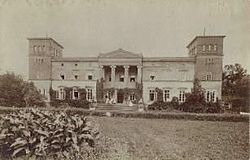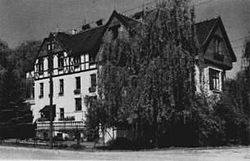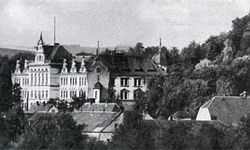
Home economics, also called domestic science or family and consumer sciences, is a subject concerning human development, personal and family finances, consumer issues, housing and interior design, nutrition and food preparation, as well as textiles and apparel. Much less common today, it was, and is, most commonly taught in secondary school or high school.

"Heil dir im Siegerkranz" was the Kaiserhymne of the German Empire from 1871 to 1918 and royal anthem of Prussia from 1795 to 1918.

Elisabeth Adelheid Hildegard von Thadden was a German progressive educator and a resistance fighter against the Nazi régime as a member of the Solf Circle. She was sentenced to death for conspiring to commit high treason and undermining the fighting forces (Wehrkraftzersetzung).

Reifenstein Abbey was a Cistercian abbey near the present village of Kleinbartloff in the Eichsfeld in Thuringia, Germany.

Christine Teusch was a German politician of the Zentrumspartei and the Christian Democratic Union.

Max Johann Otto Adolf Tortilowicz von Batocki-Friebe, usually known as Adolf von Batocki-Friebe, was a German noble, lawyer and politician, and belonged to a noble Lithuanian family.
Ida Raming is a German author, teacher and theologian.

Maximilian August Scipio von Brandt was a German diplomat, East Asia expert and publicist.

Elisabeth Cruciger, a German writer, was the first female poet and hymnwriter of the Protestant Reformation and a friend of Martin Luther.

The Corps Borussia Bonn is a German Student Corps at the University of Bonn.

Landfrauenschule Metgethen was a German women's school in Metgethen, which became part of Königsberg in 1939.
Ida von Kortzfleisch (1850-1915), was a German educator. She is known as the founder of the Reifensteiner Schulen, a chain of household schools for women which became very popular and influential from 1896 onward.

Bad Homburg Castle or Homburg Palace is a castle and palace in the German city of Bad Homburg vor der Höhe. Originally the residence of the Landgraves of Hesse-Homburg, it was first built in the 12th century.

Anna Juliane Bochkoltz was a German operatic soprano, voice teacher and composer. She performed her first concert in 1843, then studied in Brussels and Paris. After singing concerts in Paris, London and Berlin, she appeared in the 1850s on opera stages in Wiesbaden, Frankfurt, Munich and Coburg. She was known for the range of her voice, and was regarded as one of the important dramatic coloratura sopranos of her era, appearing as Mozart's Donna Anna, Beethoven's Fidelio and Bellini's Norma. She later taught singing in Vienna, Strasbourg and Paris.
Annie Leuch-Reineck was a Swiss mathematician and women's rights activist. She was one of the most influential participants in the Swiss women's movement during the 1920s and 1930s.
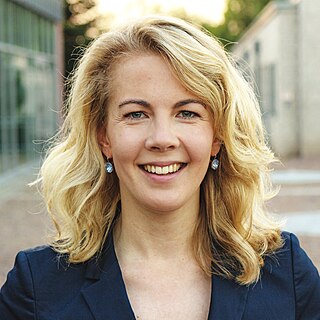
Linda Teuteberg is a German lawyer and politician of the Free Democratic Party (FDP). Serving as a member of the Bundestag since 2017, she was elected as General Secretary of the FDP on 26 April 2019 and thereby became part of the party's leadership around chairman Christian Lindner. Lindner asked for and received her resignation effective 19 September 2020.
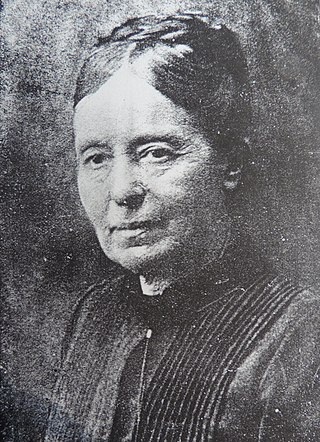
Adele Zay was a Transylvanian teacher, feminist and pedagogue. Her family were part of the German-speaking community of the Kingdom of Hungary. Because of her father's death during her infancy, Zay's education was interrupted by periods where she taught to earn money in order to continue private and formal studies. In 1880 after studying abroad in Vienna and Gotha, she passed her primary education certification for Germany and Hungary. The following year, she was certified as a secondary teacher, becoming the first Transylvanian woman to have earned a higher education. From 1875 to 1884, she taught at the Institute of Irma Keméndy in Szeged.

Matthias Stickler is a German historian.

Lita zu Putlitz, was a German woman writer.
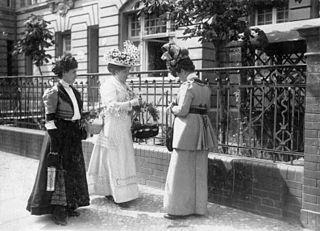
Vaterländischer Frauenverein was founded by the Prussian Queen Augusta on 11 November 1866. Initially, its reach was only the city of Berlin.












